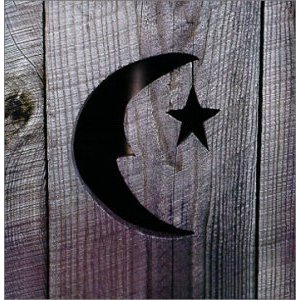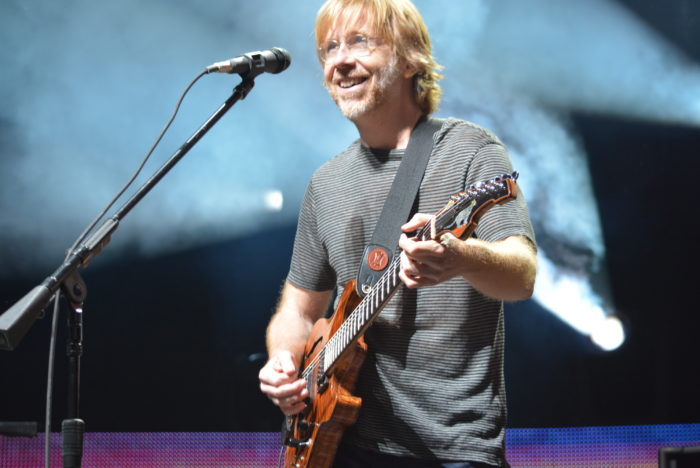
JW: Yeah, that was going to be my next question, because certainly if you weren’t analyzing those songs in the live setting, you would wind up over-analyzing them in the studio. As a producer, isn’t that what you tend to do?
TA: Definitely. The whole goal with this album was to have the recording process seem just like another show. What we did was we went into the studio October 11th, the day after the Albany shows. I think October 10th was the last day of Fall Tour. So we just set up the gear. Everybody came in and we just kept playing. You wouldn’t have wanted to be in there…
JW: I think I would have wanted to be in there.
TA: (laughs) Oh, it was really fun. It really was just such a good vibe. Not to overspeak it, but everybody’s just getting along incredibly well right now and they were during the making of that album. That’s why I was saying it’s funny. It’s like on the one hand, I had a really heavy role in the making of this album. It seemed more like the way that Phish really is in terms of the way that we interacted compared to a couple of the previous albums, because everybody was just playing their roles. Nobody was threatened. If you look all the way back to Rift or something, it’s always been basically the same vibe. Certain people are more prolific. For example, let’s say I was sitting at the board for ten hours doing a mix with Bryce (Goggin, co-producer) and we were deciding whether or not the high hat should get erased or something, or should be overdubbed. If Fish was just sitting in the room, on the couch, blabbing away in the background, I felt more confident. So, it’s not like his role isn’t important. He likes to stay up late, so he would come hang out at the barn while we were doing a really late night. I was always really encouraging him to come over. So, he was not actually producing the album, but still, it wouldn’t have been the same without him.
JW: Would he ever speak up if he had an objection to something?
TA: He would speak up, but it doesn’t happen too often.
JW: Did it happen at all with Farmhouse?
TA: Yeah, but I’ve got a better example of when it happened with another older album when we didn’t listen to him (laughs). It was actually the time when we learned to listen to him. You know that song, “If I Could” on Hoist? Well, right at the end of that, we got into this conversation in the studio with Paul Fox, our producer saying to me, “I really think the vocals should come back in again, because then it’s like a pop song.” I had this string thing that I had written out for the outro, where it builds up, you know? (Trey sings the melody). In my mind, that would just kind of roll on endlessly for like the next ten minutes (laughs). Then Paul kind of brought up this point. He said, “It’s really a good pop song, if you bring the vocals back in again.” Then he said, “Figure out a way to bring the vocals back in.” So, we came up with that thing that’s on the album, where they sort of come blasting in at the end. Fish hadn’t been around for a couple of days when we recorded it and then he came walking in and he was just like, “Oh my god! It sounds like REO Speedwagon!” (Laughs). But we had just spent days working on this thing, you know, hours of work that he hadn’t seen. So, everybody was like, “Oh, shut up Fish. You always come walking in here. You’re never here when we’re recording.” (laughs) So, we didn’t listen to him and I didn’t hear that album again for years because I don’t usually listen to our albums. So one day it was on and that part came on and it just sounded so bad to me and it sounded exactly like REO Speedwagon (laughs). I remembered, years later that if I had just listened to Fish…It was at that point that I realized his role in the studio, which is Fish just kind of runs around being Fish and then after you’re kind of near the end of a mix, you just kind of bring him in the room and let him stand there and see how he reacts.
JW: Gotta give him credit.
TA: (laughs) Yeah, exactly.
JW: I’ve noticed that a lot of the tours seem to have certain themes. You had the funk in ’97, the last tour concentrated more on your solo material and the whole groove thing. Is there any kind of preparation for the upcoming tour or the Radio City shows? Are you trying to put an emphasis on something else? Do you even plan it ahead that far?
TA: Not this time. We all kind of just took off after we made the album. We just saw each other for the first time a couple of days ago. I’ve been playing a lot of acoustic music. That’s all I’ve been doing. I’m not sure if that’s something that will appear in this tour or not, but I just was talking to Fish this morning and I played him a bunch of new songs and he’s really excited and I think Page and Mike are as well. That might be a direction that we would go in over the next year or two.
JW: Will there be any new material unveiled on this tour?
TA: I don’t know yet. Probably, I wouldn’t be surprised, but I don’t know if there will be or not.
JW: I know in the past, the band has done a lot of improvisational exercises, dating back to the early ’90s. You were even composing transitions between songs. What’s the preparation like going into shows these days? Is there any of that or is it more of just going out and letting it happen?
TA: We’ve been really been just going out and letting it happen. Like at the New Year’s show, as an example, we had nothing planned at all.
JW: Even the set list?
TA: Oh, no. We haven’t planned a set list now for a couple of years.
JW: Well that’s pretty tough compared to a regular show. I mean, after doing a three-set show the night before, and an afternoon set to go out and play eight hours straight.
TA: Yeah (laughs). But it worked, at least for me. I mean, we felt really good about that night. We just felt great about it. In the past, for a really big show like that we probably would have tried to do something crazy.
JW: Like a “Harpua” or “Forbin’s.”
TA: Yeah, like planned out some big thing and we just fought that urge fully. We just told ourselves was all we were going to do is hang out backstage and when it’s time to go on, we’re going to go on and just play whatever we feel like playing at the time and not think about it at all. That has been a big learning experience for us. It’s all part of the same thing with the first question you asked. To me, improvisation is instantaneous composition. There’s a safety in planning. I was talking about that Joni Mitchell album. When I listen to that album, it’s like you so clearly see who she was and kind of how old she was and what relationship issues she was going through. It takes guts to just bare your soul in that way. I think it’s the same as just going on stage and just playing exactly what you want play at any given time. That’s who you are. You know, there’s safety in knowing that you’ve got this big show planned out that’s definitely going to go to a finale and the best song is going to be last.



No Comments comments associated with this post